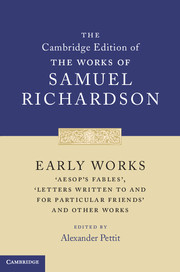Book contents
- Frontmatter
- Dedication
- Contents
- General Editors’ Preface
- Acknowledgements
- Chronology
- List of Abbreviations
- General Introduction
- Textual Introduction
- The Apprentice’s Vade Mecum (1733)
- A Seasonable Examination of the Pleas and Pretensions (1735)
- Preface to Aubin, A Collection of Entertaining Histories and Novels (1739)
- Aesop’s Fables (1739)
- Letters Written to and for Particular Friends (1741)
- Six Original Letters Upon Duelling (1765)
- Appendix: The Infidel Convicted (1731)
- Postscript
- Emendations
- Word-division
- Bibliographical Descriptions of Early Editions
- Explanatory Notes
- Index
Letter II
Published online by Cambridge University Press: 30 June 2022
- Frontmatter
- Dedication
- Contents
- General Editors’ Preface
- Acknowledgements
- Chronology
- List of Abbreviations
- General Introduction
- Textual Introduction
- The Apprentice’s Vade Mecum (1733)
- A Seasonable Examination of the Pleas and Pretensions (1735)
- Preface to Aubin, A Collection of Entertaining Histories and Novels (1739)
- Aesop’s Fables (1739)
- Letters Written to and for Particular Friends (1741)
- Six Original Letters Upon Duelling (1765)
- Appendix: The Infidel Convicted (1731)
- Postscript
- Emendations
- Word-division
- Bibliographical Descriptions of Early Editions
- Explanatory Notes
- Index
Summary
From an Uncle to a Nephew, on his keeping bad Company, bad Hours, &c. in his Apprenticeship.
Dear Nephew,
I am very much concerned to hear that you are of late fallen into bad Company; that you keep bad Hours, and give great Uneasiness to your Master, and break the Rules of his Family: That when he expostulates with you on this Occasion, you return pert and bold Answers; and, instead of promising or endeavouring to amend, repeat the Offence; and have enter’d into Clubs and Societies of young Fellows, who set at naught all good Example, and make such Persons who would do their Duty, the Subject of their Ridicule, as Persons of narrow Minds, and who want the Courage to do as they do.
Let me, on this Occasion, expostulate with you, and set before you the Evil of the Way you are in.
In the first Place:What can you mean by breaking the Rules of a Family you had bound your self by Contract to observe? Do you think it is honest, to break thro’ Engagements into which you have so solemnly entered; and which are no less the Rules of the Corporation you are to be one Day free of, than those of a private Family?——Seven Years, several of which are elapsed, are not so long a Term, but that you may see it determined before you are over-fit to be trusted with your own Conduct: Twenty-one or Twenty-two Years of Age, is full early for a young Man to be his own Master, whatever you may think; and you may surely stay till then, at least, to chuse your own Hours, and your own Company; and, I fear, as you go on, if you do not mend your Ways, your Discretion will not then do Credit to your Choice. Remember, you have no Time you can call your own, during the Continuance of your Contract; and must you abuse your Master in a double Sense; rob him of his Time, especially if any of it be Hours of Business; rob him of his Rest; break the Peace of his Family, and give a bad Example to others? And all for what?
- Type
- Chapter
- Information
- Early Works'Aesop's Fables', 'Letters Written to and for Particular Friends' and Other Works, pp. 336 - 339Publisher: Cambridge University PressPrint publication year: 2011

